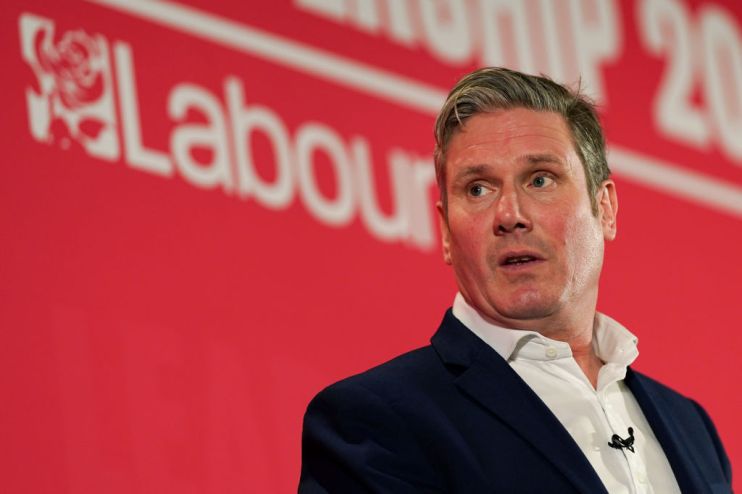Keir Starmer is reminding Labour what winning looks like

For Labour members, the interminable leadership contest has been a never-ending ordeal.
Increasingly desperate pleas from the candidates have been interrupted only by a line of unwatchable TV debates.
For everyone else, it has barely registered. Coronavirus, floods, and the internal battles within Downing Street have far overshadowed the question (as Have I Got News For You put it) of who gets to lose to Boris Johnson in 2024.
But complacent Tories who see the leadership race as a sideshow might want to tune in to what’s been going on — namely, how a party shredded with division after an electoral disaster seems to be coalescing around a single candidate.
On paper, Sir Keir Starmer ticks none of the right boxes. He’s male — an embarrassment for a party that has never had a female leader despite traditionally championing, women’s rights. He’s also white and went to private school — black marks in the age of identity politics — and he grew up in the metropolitan bubble that is London.
Most damagingly, Starmer was not only an ardent Remainer in the EU Referendum but has spent the last three years continuing the fight as shadow Brexit secretary. He was instrumental in softening his party’s position, resulting in the commitment for a second referendum in Labour’s 2019 manifesto.
All the electoral logic suggests that Labour needs a northern Brexiteer from a minority background with top-notch working-class credentials if it is ever to recover.
And yet, Starmer is way out ahead, despite the best efforts of the unions and pressure group Momentum that dominated the party under Jeremy Corbyn. The latest polls put him on 53 per cent of the vote — enough to win outright. Why?
For Starmer’s critics, the answer is that Labour members have lost their minds. That was certainly the view of the trade unionist I encountered on Sky News last week, who argued that Labour’s failure in December could be pinned entirely on its Brexit policy, which could in turn be laid at the feet of its Brexit secretary.
Anyone supporting the man who had, in his eyes, single-handedly lost Labour the election was either mad, or actively trying to undermine the party.
This analysis is convenient for Labour’s hard-left contingent, as it lets them off the hook. The architects of the Corbyn project don’t have to consider their own role in its defeat — a leader derided on doorsteps, a vicious internal war that saw dedicated MPs shafted by party insiders, and a manifesto that failed to resonate with its target audience.
By writing December off as the “Brexit election”, they can maintain the myth that the policies weren’t the problem, rekindling Corbyn’s absurd claim that Labour “won the argument” even if it lost the vote.
And they can push Rebecca Long-Bailey, groomed for years as the “continuity Corbyn” candidate, to lead the party further along a road that voters have twice rejected.
But within Labour, it seems there exists a growing cohort who care more about electoral results than ideological purity. And they have figured out that Starmer is more formidable in this political climate than his critics realise.
For a start, even if the call for a second referendum was a major factor in Labour’s downfall in December, we’re now in a brave new post-Brexit world. While debates over Britain’s trade links with the EU rage on, the question of whether to Leave or Remain was answered on 31 January.
The issue has been neutralised: people voted to “get Brexit done”, it has been, and the next election will be fought on different grounds.
If Labour wants to win power, it needs a leader who can fight the Conservatives where they are weak. With the Tories’ ambitious spending programme, that doesn’t mean tacking further to the left and promising voters an endless list of giveaways (like free broadband, mass renationalisation, or banning work emails out-of-hours).
Rather, it means looking back to an era when Labour actually won elections and remembering what worked: calm, cultivated expertise — in which a down-to-earth but engaging human rights barrister, rumoured to be the inspiration for the hero in Bridget Jones’s Diary, excels.
It also means someone who can go toe-to-toe with the Prime Minister, bring out the sense of sloppiness that is already beginning to plague his government, and puncture the personality cult around him.
This week, with Johnson facing criticism for being AWOL during a flooding crisis, would have been the perfect time for a quicksilver rhetorician to make the House of Commons laugh at the bumbling Prime Minister’s shabby excuses for sticking to his holiday plans, rather than letting him get away with a joke about cabinet briefing rooms.
Right now, barely two months after the election, Johnson seems invincible. But over the next five years, he will slip up, and his cabinet’s discipline will fray. An opposition leader able to capitalise on that, showcasing polish and competence as a viable alternative to every bungled crisis, is a serious threat.
As for whether a posh white man from a leafy part of London could ever resonate with working-class voters in Labour’s heartlands, Boris Johnson has already proved decisively that one can.
So if Starmer is as popular as the polls suggest, it isn’t because Labour members have given leave of their senses — it’s because they have finally remembered what it takes to win.
Main image credit: Getty